MATH FOR MACHINE LEARNING SUMMER SCHOOL

Maths for Machine Learning is a one-week summer school organized by Ecole Polytechnique and EMINES-UM6P in the framework of the joint chair between Mohammed VI University (UM6P), Ben Guerir, Morocco and the Ecole Polytechnique "Data Science and Industrial Process". The first edition 2022 of the summer school will take place at EMINES - Université Mohammed VI (UM6P), Ben Guerir, Morocco from July 25 to 30, 2022 and will cover the theoretical aspects of machine learning. Lectures will present the mathematical foundations of different algorithms with a strong focus on generative models. The week-long summer school will allow participants to learn from renowned professors about the latest research in the field. These high caliber educators will be available all week to exchange with the students and answer their questions. In addition, they will provide them with valuable academic advice as they present their work in dedicated sessions, allowing them to further improve their future research.
Learn more about the organizers :
The summer school is orginized by the joint chair between EMINES - Mohammed VI University (UM6P), Ben Guerir, Morocco and the Ecole Polytechnique held by Éric Moulines, Professor of Statistics at the École polytechnique, affiliate professor at EMINES and member of the Paris Academy of Sciences.
PROGRAM :
| Sun 24/7 | Mon 25/7 | Tue 26/7 | Wed 27/7 | Thu 28/7 | Fri 29/7 | |
| Breakfast | ||||||
| 09H00 - 09H50 | Giovanni Conforti | Valentin De Bortoli | Alexey Naumov | Dmitry Kropotov | Dmitry Kropotov | |
| Break | ||||||
| 10H00 - 10H50 | Ali Idri | Giovanni Conforti | Giovanni Conforti | Ali Idri / Fatima ezzahrae Nakach | Valentin De Bortoli | |
| Break | ||||||
| 11H00 - 11H50 | Alain Durmus | Alain Durmus | Dmitry Kropotov | Alain Durmus | Valentin De Bortoli | |
| Lunch Break | ||||||
| 14H00 - 14H50 |
RECEPTION & CHECK-IN
|
Alexey Naumov | Alexey Naumov | Ali Idri/ Hasnae Zerouaoui | Giovanni Conforti | |
| Break | ||||||
| 15H00 - 15h30 | Samsonov | Plassier | Tiapkin | Jimenez-Moreno | ||
| 15h30 - 16h00 | Puchkin | Philippenko | Clavier | Kodryan | ||
| 16h00 - 16h30 | Lecomte | Allard | Matthew | Janati | ||
| 16h30 - 17h00 | Break | |||||
| 17h00 - 17h30 | Huix | Abadie | Said | Sinilshchikov | ||
| 17h30 - 18h00 | Rémi | |||||
| 20h30 |
Ping-pong, chess tournament, Jam Session
|
FootBall tournament |
VolleyBall tournament
|
|||
Student presentations last 45' and are structured as follows:
- 15' of a conference type presentation with slides + 30' of a more detailed presentation of a result, which can be theoretical or practical [software demonstration].
- The schedule of the presentation of the students will be announced later.
- All students who wish to present a result must attach a presentation proposal to their application and send a request to: This email address is being protected from spambots. You need JavaScript enabled to view it.
SPEAKERS :
Alain Durmus : Associate professor at ENS Paris-Saclay (previously Cachan) and a member of the Borelli Centre
Valentin De Bortoli : CNRS researcher Center for Science of Data, ENS Ulm, Paris
Alexey Naumov : National Research University Higher School of Economics
Jamal Atif : Professor at the University of Paris-Dauphine, Project Manager "Data science and artificial intelligence" at the Institute of Information Sciences and their Interactions
Dmitry Kropotov : Research fellow Lomonosov Moscow State University
Ali Idri : Affiliate Professor at MSDA, UM6P, Ben Guerir
Giovanni Conforti : Assistant professor in probability at CMAP, École Polytechnique
ABSTRACT OF CONFERENCES :
- we provide an overview of the existing methods. In particular, we consider methods based on the principle of optimism in face of uncertainty and optimism by injecting noise. We consider advantages and drawbacks of the methods.
- propose the BayesUCBVI algorithm which uses the quantile of a Q-value function posterior as upper confidence bound on the optimal Q-value function. We guarantee a high-probability regret bound of order at most O(√H³SAT ) that matches the lower-bound of Ω(√H³SAT ) .
- Crucial to our analysis is a new fine-grained anti-concentration bound for a weighted Dirichlet sum that can be of independent interest.
- There is no fee to attend the school
- Accommodation and board on campus are provided. Click on the following link to learn more about accommodation.
- Travel costs are not covered and remain the responsibility of the participants. A shuttle will be provided from Casablanca airport on July 24th. If it is necessary to obtain a visa, an invitation letter will be sent to you
- Registration is open for PhD students in the field of Machine Learning, interested Masters students are also encouraged to apply.
- Complete the following FORM to send your application, full CV and presentation summary are required for submission.
- For more information on registration, please contact: This email address is being protected from spambots. You need JavaScript enabled to view it.



